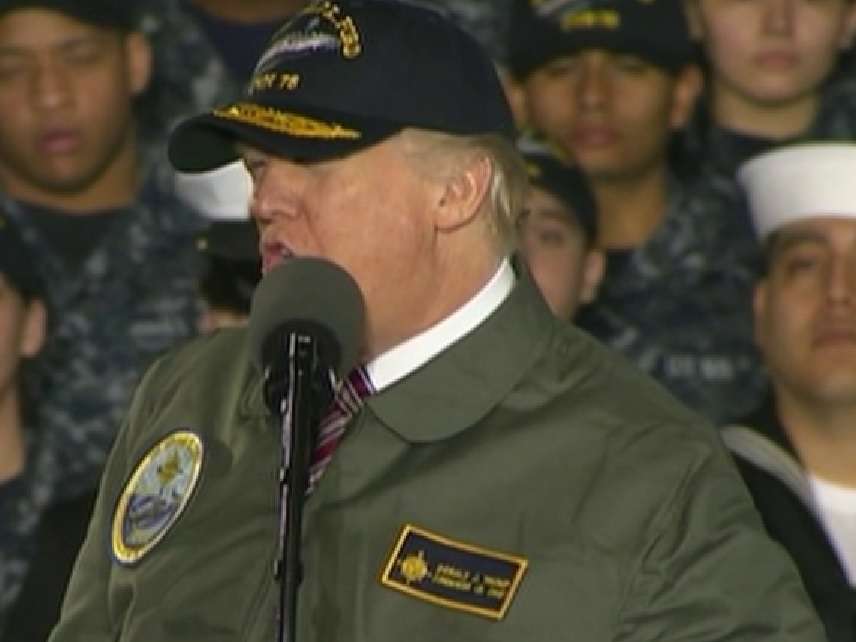Trump Signs Sanctions Bill That Exacerbates Global Instability
Democrats put Iran deal at risk to score points on Russia.

Today President Donald Trump signed H.R. 3364, the Countering America's Adversaries Through Sanctions Act, which tightens sanction on Russia, Iran, and North Korea. He also issued a signing statement expressing a number of reservations with the bill, mainly about its limits on the president's power to deescalate tensions by reducing sanctions unilaterally. Nevertheless, he promises to "give careful and respectful consideration to the preferences expressed by the Congress" while implementing them "in a manner consistent with the President's constitutional authority to conduct foreign relations."
While it's important for Congress to assert its constitutional authority in the conduct of foreign relations, H.R. 3364 suggests its priorities are skewed. Additional sanctions will only hurt U.S. relations with the affected countries. Congress should instead be focused on asserting its authority where it has long abrogated it: issues of war-making and treaties. Yet it has shown little interest in this, even as various members of Congress have expressed their belief that the president presents a unique threat to global stability.
Now a new National Defense Authorization Act is working its way through Congress with little concern for reining in a decade-and-a-half-long war on terror that has mostly increased the threat of terrorism by creating new safe havens for terrorists across the Muslim world. Rather than reassert its role in a global war spinning out of control—one that by all indications President Trump is escalating further—Congress has chosen to install more obstacles to peace. Congressional Democrats, in particular, are sacrificing the progress made by Barack Obama in U.S.-Iranian relations, all to advance their narrative that Russia poses a grave threat to American democracy.
In a Wall Street Journal interview, the complete transcript of which Politico released yesterday, Trump said if it were up to him the U.S. would have already withdrawn from the Iran nuclear deal. His administration has certified twice already that Iran is in compliance with the nuclear deal, and Secretary of State Rex Tillerson acknowledged in comments yesterday that he and the president disagree on the nuclear deal's usefulness. In the Journal interview, Trump indicated he was deferring to the State Department.
In March, President Trump suggested he would be "honored" to meet with Kim Jong Un. In an additional statement accompanying his H.R. 3364 signing statement, the president complains that the bill "encroaches on the executive branch's authority to negotiate" with other countries. "Congress could not even negotiate a healthcare bill after seven years of talking," Trump noted.
Trump should not hesitate to have one-on-one talks with Kim, or with the presidents of Iran or Russia. Such meetings have a lot of potential upside and not much of a downside, as relations with all three countries are pretty poor already.
Trump concludes his signing statement with some comments on Ukraine, which celebrated the new sanctions against Russia. His administration, Trump insists, "particularly expects the Congress to refrain from using this flawed bill to hinder our important work with European allies to resolve the conflict in Ukraine, and from using it to hinder our efforts to address any unintended consequences it may have for American businesses, our friends, or our allies."
Undermining U.S. foreign relations is easy, particularly when politicians have been whipped up in a xenophobic fervor. Improving peaceful foreign relations is difficult, and this bill only makes it more so. It doesn't just impose new sanctions without a strategy for how to improve relations with the affected countries, but it limits the options available to salvage these relations—a potentially deadly case of path dependence.


Show Comments (36)